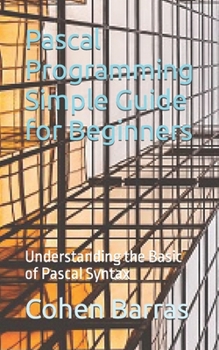Pascal Programming Simple Guide for Beginners: Understanding the Basic of Pascal Syntax
Pascal Programming Simple Guide for Beginners Pascal is a high-level, imperative, and statically typed programming language that was created in the late 1960s by Swiss computer scientist Niklaus Wirth. It was named after the French mathematician and philosopher Blaise Pascal. Pascal was designed with a strong emphasis on readability and structured programming, making it an excellent choice for beginners as well as experienced programmers.
Pascal gained significant popularity in the early days of computing due to its simplicity and efficiency. It was widely used in education and as a development tool for various applications, including scientific and engineering software. One of the most famous Pascal compilers is Turbo Pascal, developed by Borland, which played a significant role in popularizing the language. Pascal is known for its clean and well-defined syntax, which promotes good coding practices and makes it easier to write bug-free and maintainable code. It also supports strong type-checking, meaning that the data types of variables must be explicitly declared, reducing the chances of type-related errors.
Pascal has evolved over the years, and different dialects of the language have emerged, such as Object Pascal, which introduced object-oriented programming features. Delphi, a popular integrated development environment (IDE), is based on Object Pascal and has been used for developing Windows applications. TO CONTINUE READING, GRAB YOUR COPY NOW
Pascal gained significant popularity in the early days of computing due to its simplicity and efficiency. It was widely used in education and as a development tool for various applications, including scientific and engineering software. One of the most famous Pascal compilers is Turbo Pascal, developed by Borland, which played a significant role in popularizing the language. Pascal is known for its clean and well-defined syntax, which promotes good coding practices and makes it easier to write bug-free and maintainable code. It also supports strong type-checking, meaning that the data types of variables must be explicitly declared, reducing the chances of type-related errors.
Pascal has evolved over the years, and different dialects of the language have emerged, such as Object Pascal, which introduced object-oriented programming features. Delphi, a popular integrated development environment (IDE), is based on Object Pascal and has been used for developing Windows applications. TO CONTINUE READING, GRAB YOUR COPY NOW
Format:Paperback
Language:English
ISBN:B0CHL3RWGC
ISBN13:9798861043755
Release Date:September 2023
Publisher:Independently Published
Length:74 Pages
Weight:0.18 lbs.
Dimensions:0.1" x 5.0" x 8.0"
Customer Reviews
0 rating





